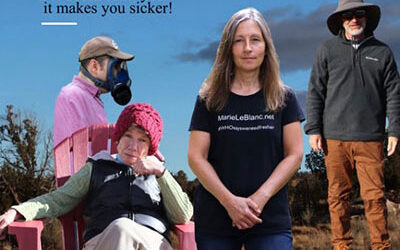Women with environmental illness are not alone: study shows women with cancer and multiple sclerosis get separated or divorced seven times more often than men.
 Women with environmental illness who have watched friends, family, co-workers, bosses, colleagues, and even spouses disappear from their lives after they became debilitated by chemical sensitivity might be surprised to know that a recent study shows that women with cancer and multiple sclerosis are more likely than men to become separated or divorced.
Women with environmental illness who have watched friends, family, co-workers, bosses, colleagues, and even spouses disappear from their lives after they became debilitated by chemical sensitivity might be surprised to know that a recent study shows that women with cancer and multiple sclerosis are more likely than men to become separated or divorced.
Yep, “when faced with the serious illness of a spouse, men are far more likely to walk away than women,” writes Salynn Boyles of WebMD Health News. She goes on to say that for those who were studied, the separation or divorce rate within an average of six months of being diagnosed for women with cancer or multiple sclerosis was 21% — seven times higher than men in the same situation, who only experienced a 3% separation/divorce rate.
Fred Hutchinson Cancer Research Center neuro-oncologist Marc Chamberlain, MD, told WebMD that “in this study at least, the men did not show the same level of commitment and emotional attachment to their sick spouse, family, and home as women did.”
A downside of the study as far as we can see, is that it did not take into account whether the marriages that ended were troubled before the illness presented, or whether it was the husband or wife who initiated the split.
While not part of this particular study, people with chemical sensitivity know about abandonment — and not just from spouses. Chemical sensitivity, especially the more severe form, can be a devastating illness for many of its sufferers. It’s an illness that affects more women than men, and aside from the debilitating symptoms (which can include brain fog, heart arrhythmias, seizures, and respiratory distress), one of the most challenging aspects of the condition is the social isolation required since symptom triggers include many commonly used household and personal care products that can be detected in most public places; basically, wherever you find people. To add insult to injury, sufferers find that many people present in their former healthy lives disappear after they get ill and are forced to make extensive lifestyle changes.
It is so difficult for family, friends, co-workers, and colleagues to understand an illness they cannot see or experience for themselves, and cannot explain. The condition requires change on the part of others in order to merely share space on the planet; toxic synthetic shampoos, hair dyes, nail polish, dry cleaning, smoking habits, hand lotions, sunscreen, and even the fumes from a hot pot of coffee can have devastating effects. The biggest toll seems to be taken in the realm of relationships.
Psychologist Nicholas LaRocca, PhD, of the National Multiple Sclerosis Society (NMSS) explained to WebMD that “when you are dealing with a serious illness, relationship issues may be ignored,” he says. “Not all marriages can or should be saved, but many that end in divorce probably could be saved with the right kind of support.”
With chemical sensitivity, not only is there no support for sufferers and their spouses, but daily experiences with health care providers, friends and family can be completely unsupportive. The resulting stress levels can be extremely high, and fairly constant, and can test even the strongest of relationships. In addition, spouses lifestyles should be impacted nearly as much as the patient’s in order to manage symptoms, and when they are not, conflict undoubtedly arises. Many MCS sufferers are abandoned by spouses who cannot accept, or even understand the need for, the drastic curtailment of social activities and the constant exposure management that comes with this illness.
For this reason, it is important to find sources of support outside one’s marriage or relationship if one gets seriously ill, and especially in the case of environmental illness. There are many support groups on the Internet where hundreds of others with a similar illness may provide practical advice, share coping skills, and give emotional support and comfort. Finding a therapist might also be helpful, but in the case of environmental illness it is important to find a provider who is aware of MCS and believes it is a physiological condition.
It is also critical that the spouse of an MCS sufferer develop a strong support system for venting frustrations and fears. Even to have one person they can talk to who can provide an understanding ear — without questioning the reality of the illness. Spouses are likely to be under extreme duress themselves while trying to exist in the “toxic” world to make a living and do household errands and then “decontaminate” themselves so as to not cause distressing symptoms in their partner. It would also be helpful to maintain an outside (non-toxic) hobby and social outlet so that the non-MCS spouse’s life is not completely decimated by the illness and they can retain opportunities for stress release that are outside of the relationship.
source: webmd.com
photo: Divorce © José Luis Gutiérrez









Yes, its true. Even before her symptoms got very bad, my father asked for my mom to give him a divorce. I was very angry and at that teenish age, didnt deal with it well. I ended up staying out too late without a ride home, and he was so angry having to pick me up that he started to hit me. I told him that I knew what he was going to do to my mom, and he was a horrible person for being so weak, and I would be out of his life forever if he did it. He changed his mind. He ended up caring for her until she died last year. Every so often I had to remind him that if it was him who was that ill, she would never have left him without help. I know hes glad he did the right thing, even though it took a beating for me to say it I am glad I did. Caring for an ill person facilitates personal and spiritual growth…you can dodge it, but dodging gods challenges mean you will have to repeat them later.